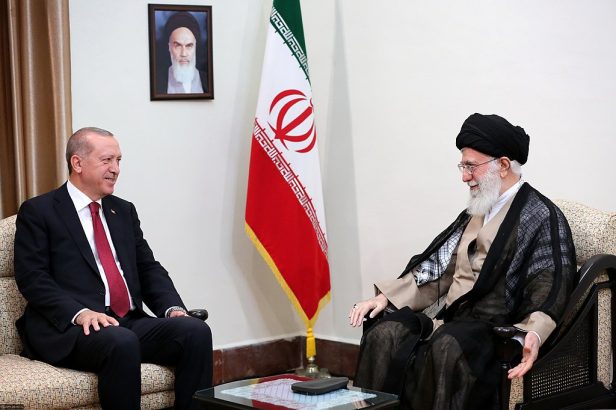Olga Kirschbaum-Shirazki is a co-founder and editor of the Tel Aviv Review of Books and a visiting fellow at the Tel Aviv Institute. She argues that while there is an understanding that European imperial powers made a mess of the Middle East and Africa over the course of the twentieth century, little is said about the fact that Iranian, Turkish, and Arab state violence towards national groups seeking their independence has been deadly and one of the major sources of violence in the Middle East, right up to today. Palestinian maximalism is an extension, under a different name, of the Arab imperialism present in all of the post-WWI states, which claimed that where Arab Muslims are a significant part of the population, they should rule.
In our age of bitter debates about nationalism, it is worth taking a moment to consider the legacy of the creation of smaller states within continental Europe since WWI. Almost a quarter of a century into the third millennium, the nation states of Europe have proven to be more stable and governable, as well as more democratic, compared with other political forms. The most successful states of the postwar period – if the measure is the prosperity of their citizens and the transparency of their governments – are the nation states of Scandinavia with their now semi-autonomous Sami and Inuit minorities. The great achievement of the European Union is not its unity and its dubious political structures with their lack of transparency and accountability, but rather the national sovereignty of the peoples of Europe, united by language, culture, and ethnicity, who are its constituent members in a continent where empires once ruled.
What is more, nation states have been the most successful unit for maintaining a concept of the public good and constraining multinational companies and state monopolies. Indeed, the state and its laws are arguably the only thing that can successfully ensure that workers and locals are not horribly abused. Multinationals thrive most in states where leftover imperial racial hierarchies persist in shattering any notion of common good – this is the story of all of the former settler colonies in the Americas with the possible exception of Uruguay, where the small country is largely an amalgam of Spanish and Italian immigrants, the indigenous population minute by the nineteenth century, decimated by disease since European colonization and a genocidal war. In many cases these hierarchies are still part of the legal structure of the country, especially with the abrogation of treaties with First Nations. All of these countries, to varying degrees, have a radically impoverished underclass, often made up of indigenous peoples, and in some cases of the African diaspora.
The imperial mentality has also characterised their extractive relationship to resources in resource-rich territories. In many regions of Africa, the failure to create states based on historical commonalities i.e. nation states – including tribal confederations of related groups, the original structure of most national groups – has made it so much easier for corruption to take hold as historical rivals living in the same state vie for its control. In contrast, while far from perfect, the nation states of Europe have been more successful in protecting their resources and environments from the worst instances of corporate abuses through laws and policies. Norway is perhaps the best example with its oil fund. Social democracy is a largely European phenomenon because it works best in nation states. Relative ethnic and cultural homogeneity helps to create and preserve a notion of public good. And despite this obvious historical reality, we have an entire intellectual class in the West which is anti-nationalist.
Imperial rollback has taken on other forms within the continent in the form of confederations. The shift in Spain to a State of Autonomies and the concomitant language, cultural, and political rights given to the Basques, Catalans and Galicians, has been another path. This is one shared to some degree by the United Kingdom, where Welsh language rights are now firmly entrenched and regional power strengthened.
That is not say that all questions have been resolved. From the Catalan to the Scottish Independence movements, to the question of Northern Ireland, the rollback of the colonisation that occurred within Europe often preceding the great imperial conquests overseas — is unfinished. The Scandinavians have only recently started to address their history with the Sami and in Denmark to the Inuit. In France, regional national languages and cultures have more protections than before, though the centralised state is still very much alive.
Within Europe itself outside of Russia, imperial rollback is a reality and the objective of so many activists and politicians of the post-WWI period to make sure that national rights were joined with minority rights is strong for the most part. This is even true in areas where the minority is a majority elsewhere, like the Russians in the Baltics and the Hungarians in Slovakia, Serbia, and Romania or the Swedes in Finland. And while critics will say that the establishment of nation states came at the price of the death of millions in regions of mixed populations, especially in Eastern Europe, this development was not inevitable and the project of national self-determination with provisions for minorities was already underway in the interwar years. All of this is not to say that nation states can’t be corrupt, belligerent, or oppressive of minorities. Rather it seems that, based on the historical record, including the post-communist eastern European states, they have a better chance of dealing with the issues successfully than imperial states.
The Achievement of Imperial Rollback
Of course, the history of the ‘old world’ could have taken a very different turn. The smaller people from the Atlantic to the Caucasus and Eastern Mediterranean who achieved independence or autonomy over the past century could well have lost out through forced assimilation, expulsions, or mass murder. These approaches were tried in the nineteenth and twentieth centuries by the very imperial states who have now completed their rollback. And so, the smaller peoples of central Europe did not succumb to Magyarisation, Ottoman genocides, Russian population displacements and gulags, British famines, war and chaos, or to the Nazi death machine.
WWII, so often told as a story of far-right nationalism, can also be described as a story of aggressive imperial entitlement by loser empires. Germany was at its most dangerous when it was both imperialist and had lost. The same can be said about the Ottomans who conducted their genocidal rampages after they had lost their territory in the Balkans. Yet we have a discourse of imperial apologetics in the academy especially regarding the Austro-Hungarian and Ottoman Empires as tolerant multicultural states. In this discourse, these empires were on a course of granting rights to smaller peoples, which was rudely derailed by the nationalists’ ambitions for sovereignty, and the support for these ambitions by competing empires. But such arguments fail to take into account the reality of the imperial mindset. Why should the German, Hungarians, Russians, Brits, or Ottoman Turks have ruled beyond their borders in the first place? Empire is a racket; it is the ultimate rent-seeking set up, which it was in all of these territories, whether through taxation or through the peasant labour of a smaller people for the benefit of the imperial nobility. Further, the loyalty to imperial identity or citizenship was far thinner than the Ottoman or Hapsburg apologists like to claim as the popularity of many national movements attests to. The accompanying thesis of the invention of various nationalities in the nineteenth and twentieth century, another favourite claim by historians is hard to square with reality. Preferred candidates for this claim in Europe are the different Slavic groups and in the Middle East the Jews and the Assyrians. Every single one of these ‘invented nations’ had some historical, cultural, ethnic, and linguistic identity, granted often with local variations, that made their coalescence into a national political movement possible.
Imperial rollback was not inevitable in Europe. It is an achievement. What political commentators rarely talk about in relation to this process is the lasting nature of the imperial rollback of the states and people that had once ruled the continent. Russia’s renewed imperial aggression in its old spheres of influence should not obscure the examples of Hungary, Austria, and Germany or France and Sweden for that matter. Whatever can be said about the German domination of the European Union or Hungarian nationalism, German and Hungarian imperialism – a political forces for more than a millennium in Central and Eastern Europe – are dead. Neither of the right-wing parties in either country is actively calling for German or Hungarian irredentism. For the Germans, the expulsion of their Eastern colonial diaspora has made such calls rather empty, but for the Hungarians, irridentism could still be a political force. And yet it is not. As to France and Sweden, they too are firmly national in their political outlook. There are no budding Napoleons in the French political scene, and suggesting a return of the Swedish Empire in Scandinavia and Eastern Europe, the great project of Swedish royalty for hundreds of years, would likely meet with laughter if not total confusion. With today’s discourses on the right and left about migration, the European Union, and this matter of national self-determination and its impact on European life is barely in people’s consciousness. Perhaps it is for this reason that Europeans cannot see the empires and imperial forces in the Middle East.
Imperialism and the Middle East
It is not that observers fail to see that Erdogan is a leader with neo-Ottoman pretensions. And anyone who studies the Middle East knows Iran is a multinational state. The Kurdish question is not unknown, so to speak. But it is hard to say that the necessary conclusions are often drawn in the West. Thus, while there is a ubiquitous academic discourse that European imperial powers made a mess of the Middle East – and Africa – over the course of the twentieth century, little is said about the fact that Iranian, Turkish, and Arab state violence towards national groups seeking their independence – a project they have made clear over the course of the twentieth century – has been deadly, and one of the major sources of violence in the region including today. And yet our intellectual class is obsessed with Hungarian, Polish, and Israeli illiberalism, which, whatever one might think about it, does not come close to the state violence, oppression, and corruption of the imperial states in Middle East.
And so sadly it is necessary to offer a macabre tour of what Arab, Iranian, and Turkish imperialism, often billed as nationalism, has done in the past century. One could point to the hundreds of thousands of dead Kurds at the hands of all three imperial groups, to the mass emigration of Assyrians due to violence and oppression, to the likewise massive emigration of Lebanese Christians and mass death and destruction brought on by the Lebanese civil war from Arab imperialism. Or the Turkish conquest of Cyprus and current bombardment of Rojava, not to mention Turkey’s indirect support for ISIS. And this is not to speak of the forced Turkification, Iranification, and Arabisation of minority populations, or the death of political dissidents in jails or on the gibbet. Or Iranian and Saudi support for the Islamists in the deadly Algerian civil war, as well as Qatar’s support for Islamists during the Arab Spring. Nor is this list comprehensive, even if already damning. One has to mention the dead in the Arab-Israeli conflict as well.
Arab Imperialism and the Israeli-Palestinian Conflict
Indeed, Arab imperialism is a central source of the Israeli-Palestinian conflict. With the ubiquity of the discourse about Palestinian nationalism, its Arab imperial dimensions are almost totally occluded. Yet Arab imperialism was a serious political force in the Middle East for most of the post WWI period, and remains so. It started with the aspirations of the leaders of the Arab Revolt to create a unified Arab state in the entire Levant as well as their successful sabotage, with British and French assent, of the creation of states for the other peoples in the region, most dramatically the Kurds, but also the Assyrians, Druze, and Maronites. It continued with the policies of Arabisation and Islamification of the post WWII period in all of the Arab League countries with non-Arab, non-Muslim population without exception. And while many of these policies were carried by states seeking to create a new local Syrian, Iraqi, Palestinian identity, these identities were in practice Arab and Muslim. Indeed, the creation of a Palestinian national identity never meant the rejection of an Arab identity for the Palestinians themselves, as the documents of the major political parties involved in Palestinian politics show. Palestinian maximalism is an extension, under a different name, of the Arab imperialism present in all of the post-WWI states, which claimed that where Arab Muslims are a significant part of the population, they should rule. This attitude of entitlement, characteristic of imperial peoples and their cultures, remains deeply entrenched in many countries in the Arab League. It is also present among the intellectual classes in the West, particularly those in Middle Eastern Studies departments, which idealise Convivencia in the medieval caliphates or the multicultural rainbow of ‘Iraqi’ or ‘Lebanese’ identity, vilifies sectarianism, or simply ignores the history of the national groups of the region.
Unsurprisingly, the most fascist forms of Islam find fertile ground in historical imperial states and among historically imperial cultures. Conversely, notable Kurdish, Amazigh, or Azeri equivalents are conspicuous by their absence. That is not to say that there aren’t any Islamists among the smaller peoples of the region. However, the Kurdish, Azeri, and Amazigh political movements tend to be comparatively liberalising, and their attitude towards Islam traditionalist rather than Islamist or jihadi. Instead, we find among the traditionally imperial peoples, the Persians, Turks, and Arabs, the state sponsors of terrorism and Islamism in the area.
Imperial Rollback in the Middle East
Yet, imperial rollback is underway in the Middle East. One of the least discussed but in some ways most significant aspects of the Abraham Accords is that its signatories exhibit multiple signs of imperial rollback. It is not simply the recognition of the state of Israel and normalisation. Morocco has made significant steps towards recognising the Amazigh, including language rights, official holidays, and some political rights. These internal policies demonstrate a shift away from a homogenous Arabisation or Islamification, and towards an acceptance of the history of the country its peoples and their aspirations. Gulf Arab states are also making efforts to liberalise, reject Jihad and Islamism, and even more recently to open up a frank interfaith dialogue – significant signs of imperial rollback in the context of the Arab League.
Israel, uniquely successful as a national movement in the region, is a test case for what path the region will take. This is why it is incumbent, even for those who wish to see a two-state solution, to be honest about the imperial relationship of Arabs and Islam to the areas. Yet rather than supporting these developments, and understanding their revolutionary significance, liberals across the West and in Israel minimise them or view them as part of the problem. In fact, it is they who are the problem.
One of the most damaging developments for the stability of the entire region has occurred among liberals in the West and Israel, namely the internalisation of the Arab imperial discourse in its repackaged form: Israel and Jews as European settler colonialists. Even among people who support a two-state solution, we increasingly find that they only accept Israel as a de facto reality, and agree with Palestinians that the country is indigenously Arab. Other variations of this acceptance come in the form of claiming that both Jews and Arabs are indigenous to the area. The problem with claims about Palestinian Arab indigeneity — or Arab indigeneity anywhere in the “Arab World” outside of the Gulf and Jordan — is not only that they are objectively incorrect by the UN definition of indigeneity, Arabs arrived in these regions through imperial conquest, but more importantly they serve to negate Arab imperialism past and present. The issue at stake here is not the two-state solution as an option for solving the conflict, or the existence of a Palestinian Arab collective identity tied to the land – a development exhibited by Arabs in Iraq, Syria, Algeria, Morrocco, etc. who have developed local land-based collective identities as well — but the acceptance of an ideology which fundamentally views any Jewish national sovereignty as unjust because it refuses to see any Arab or Muslim history as imperial.
Today the Palestinian Arab claim to indigeneity, as well any other Arab claim to indigeneity in the “Arab World” in areas outside of the Arab homeland, denies this imperial entitlement, while simultaneously granting its objectives legitimacy: it is a brilliant political manoeuvre.
The two-state solution cannot reasonably survive in the context of widespread commitment not only by Palestinian Arabs, but other Arabs in the region, to the sole legitimacy of Islamic and Arab power. Much of the so-called Israeli left, following or leading liberals in the West depending on who you ask, seems to be propping up this very view directly, in the case of anti-Zionists, and indirectly in the case of supporters of a confederation or two-state solution supporters who accept the narrative of Jewish settler colonialism or Palestinian indigeneity. This approach is dangerous for the entire region as well, as it usually goes hand in hand with an underestimation or even denial of the problem of local imperial culture and politics, as well as the overestimation of the responsibility of Western powers. That is not to say that peace, mutual respect, and compromise are not desirable: they are, but they cannot be based on historical falsehood, they cannot allow imperial entitlement to go unchecked propped up by false histories, and they cannot continue to project onto the Palestinian national movement, as it currently stands, a programme and outlook of mutual acceptance which it is does not in fact support. The failure to achieve Arab imperial rollback will continue to breed conflict across the region. One can see it playing out in the past year in Iraq: the current Shia Arab-dominated government has been attacking the autonomy of the Kurdistan region.
Of course, globally there are two other forces that are upholding imperial entitlement in the region, directly and indirectly. There are the left-wing parties who have historically supported the imperial enemies of the United States, whether Russia, China, or more recently Iran and Qatar. The latter have also strongly cultivated these groups in South America, Africa, and Asia. The others are the liberals in Western Europe and the Anglosphere, as well as business people from around the world whose financial interests come first. Western financial support has contributed to the lasting power of these imperial states as it has to the maximalists among the Palestinian Arabs, most spectacularly in Gaza.
Will the forces of imperial rollback win out in the Middle East? I hope so. The alternative is grim. Such a victory will however require a sea change in discourse in the history of the Middle East and the value of national sovereignty, starting in the media and educational institutions around the globe. Many are taking up the gauntlet.



































